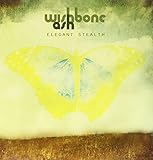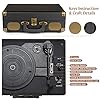Wishbone Ash Vinyl Records Lps For Sale
Check out these new and used Wishbone Ash vinyl records LPs for sale. We recommend starting your Wishbone Ash vinyl collection with the essential albums Argus, Live Dates and Pilgrimage. Our inventory is always changing, so check back often, or browse our list of vinyl records for sale from rock musicians.
Live Dates II
$45.60 (as of July 3, 2025 02:22 GMT +00:00 - More infoProduct prices and availability are accurate as of the date/time indicated and are subject to change. Any price and availability information displayed on [relevant Amazon Site(s), as applicable] at the time of purchase will apply to the purchase of this product.)Live At Rockpalast 1976
Argus: 50th Anniversary Edition 1972-202
37% OffWishbone Ash
$30.66 (as of July 3, 2025 02:22 GMT +00:00 - More infoProduct prices and availability are accurate as of the date/time indicated and are subject to change. Any price and availability information displayed on [relevant Amazon Site(s), as applicable] at the time of purchase will apply to the purchase of this product.)Living Proof: Live Recordings 1976-1980 (Ltd Vinyl Box Set)
$129.99 (as of July 3, 2025 02:25 GMT +00:00 - More infoProduct prices and availability are accurate as of the date/time indicated and are subject to change. Any price and availability information displayed on [relevant Amazon Site(s), as applicable] at the time of purchase will apply to the purchase of this product.)Wishbone Ash - 2nd
$29.99 (as of July 3, 2025 02:25 GMT +00:00 - More infoProduct prices and availability are accurate as of the date/time indicated and are subject to change. Any price and availability information displayed on [relevant Amazon Site(s), as applicable] at the time of purchase will apply to the purchase of this product.)Coat Of Arms - Yellow
36% OffLive Dates Live
7% OffElegant Stealth
11% OffWishbone Ash Wishbone Four vinyl record

Wishbone Ash: Pioneers of Twin-Guitar Harmonies
The Genesis of Wishbone Ash
Wishbone Ash, formed in 1969 in Torquay, England, holds a special place in the annals of rock history. The band, initially comprised of Martin Turner (bass, vocals), Andy Powell (guitar, vocals), Ted Turner (guitar, vocals), and Steve Upton (drums), pioneered the use of twin lead guitars, creating a signature sound that would influence countless rock and metal bands in the years to come.
The Early Years and the Debut Album
Formation and Musical Philosophy
Wishbone Ash’s formation marked a departure from the prevailing trends of the late 1960s. While psychedelic rock and blues were dominating the scene, the quartet took a different route, focusing on intricate guitar interplay and harmonies.
Wishbone Ash (1970)
The band’s eponymous debut album, “Wishbone Ash,” released in 1970, introduced their groundbreaking approach. Songs like “Blind Eye” and “Phoenix” showcased the seamless collaboration between Andy Powell and Ted Turner, blending folk, rock, and blues elements. The album set the stage for Wishbone Ash’s distinctive musical identity.
The Twin-Guitar Harmonies Phenomenon
Argus (1972)
Arguably the pinnacle of Wishbone Ash’s career, “Argus” remains a classic in the realm of progressive and folk rock. The album’s cover, featuring the iconic artwork of Roger Dean, became synonymous with the band’s identity. Tracks like “The King Will Come” and “Throw Down the Sword” exemplify the band’s mastery of harmonious guitar arrangements and melodic storytelling.
Pilgrimage (1971)
“Pilgrimage,” the band’s second studio album, continued the exploration of the twin-guitar dynamic. The instrumental track “Vas Dis” exemplifies the band’s ability to convey emotions without the need for vocals. Wishbone Ash’s sound on this album continued to evolve, solidifying their place as pioneers of progressive rock.
Exploring Musical Diversity
Wishbone Four (1973)
“Wishbone Four” marked a departure from the heavier sound of “Argus.” The album showcased the band’s versatility, featuring a range of styles from acoustic ballads like “Ballad of the Beacon” to the more blues-infused “Sorrel.” Despite being different from its predecessors, “Wishbone Four” demonstrated the band’s capacity for musical experimentation.
There’s the Rub (1974)
Released in 1974, “There’s the Rub” saw Wishbone Ash returning to a more guitar-centric sound. The album’s title track and “Persephone” are notable for their intricate guitar work and dynamic shifts. The band’s ability to balance complexity with accessibility solidified their appeal to a diverse audience.
The Changing Lineup and Continued Influence
New England (1976)
As the mid-70s approached, Wishbone Ash underwent lineup changes with Laurie Wisefield joining on guitar. “New England,” released in 1976, marked this transition. The album maintained the band’s commitment to harmonious guitar arrangements, with tracks like “You See Red” and “Outward Bound” showcasing the new lineup’s chemistry.
Front Page News (1977)
“Front Page News” continued the exploration of diverse musical styles. The album featured tracks like “Front Page News” and “Come in from the Rain,” demonstrating the band’s resilience in adapting to changing musical landscapes. Despite lineup changes, Wishbone Ash maintained their core sound, influencing both emerging and established artists.
Wishbone Ash in the 1980s and Beyond
Number the Brave (1981)
The 1980s brought challenges for many classic rock bands, and Wishbone Ash was no exception. “Number the Brave,” released in 1981, showcased a more streamlined sound. While it may not have achieved the commercial success of earlier albums, tracks like “Loaded” and “Number the Brave” highlighted the band’s enduring commitment to their craft.
Twin Barrels Burning (1982)
“Twin Barrels Burning” saw the return of the twin-guitar sound with the addition of guitarist Mervyn Spence. The album featured a more hard rock-oriented approach, evident in tracks like “Engine Overheat” and “Living Proof.” Despite the departure from their classic sound, the album maintained the energy and precision characteristic of Wishbone Ash.
Legacy and Influence
Wishbone Ash’s impact extends far beyond their commercial success. The twin-guitar harmonies pioneered by Powell, Turner, and subsequent guitarists have influenced numerous bands across genres.
Bands Influenced by Wishbone Ash
- Thin Lizzy: Renowned for their own twin-guitar approach, Thin Lizzy drew inspiration from Wishbone Ash, incorporating harmonious guitar melodies into their hard rock sound.
- Iron Maiden: The legendary metal band Iron Maiden cites Wishbone Ash as an influence on their guitar harmonies. The intricate arrangements of Adrian Smith and Dave Murray bear the imprint of the pioneering work done by Wishbone Ash.
- Mastodon: The progressive metal band Mastodon incorporates elements of Wishbone Ash’s complexity and diversity into their own music, showcasing the enduring influence of the British rockers.
Bands Similar to Wishbone Ash
- Uriah Heep: Like Wishbone Ash, Uriah Heep emerged in the early 1970s with a sound that blended progressive and hard rock. Their intricate arrangements and conceptual approach make them a kindred spirit to Wishbone Ash.
- Blue Öyster Cult: Known for their heavy use of harmonies and intricate guitar work, Blue Öyster Cult shares common ground with Wishbone Ash. Both bands navigated the fine line between hard rock and progressive influences.
- Jethro Tull: While Jethro Tull may lean more towards progressive and folk elements, their penchant for musical experimentation aligns them with the spirit of Wishbone Ash.
Conclusion
Wishbone Ash’s enduring legacy lies not only in their innovative twin-guitar harmonies but also in their ability to evolve with the ever-changing musical landscape. As pioneers of a distinctive sound, they left an indelible mark on the rock genre. From the folk-infused “Argus” to the hard-hitting “Twin Barrels Burning,” the band’s discography reflects a journey of musical exploration and experimentation. As new generations discover the magic of Wishbone Ash, their influence continues to resonate in the work of contemporary artists, ensuring their place in the pantheon of rock legends.
WISHBONE ASH - Number The Brave (Sweden Press) - 12" Vinyl Record LP - EX
 | $34.29 Buy It on eBay for only: $34.29 Buy It Now on eBay |
Wishbone Ash 45 EP FOUR TRAK RECIRDS #FT 984 Everybody Needs A Friend w/ PS Thai
 | $20.00 End Date: Saturday Jul-05-2025 17:37:27 EDT Buy It on eBay for only: $20.00 Buy It Now on eBay |
Wishbone Ash - New England 1976 LP NEAR MINT Atlantic SD18200 PROMO
 | $1.99 (1 bid) End Date: Saturday Jul-05-2025 20:30:44 EDT Bid |
WISHBONE ASH ARGUS MCA MCA5117 Japan VINYL LP
 | $3.99 (1 bid) End Date: Sunday Jul-06-2025 21:28:00 EDT Bid |
WISHBONE ASH 1973 DOUBLE LP "LIVE DATES" ON CLASSIC ROCK VINTAGE VINYL!
 | $3.99 (1 bid) End Date: Saturday Jul-05-2025 18:45:01 EDT Bid |
Wishbone Ash - Argus UK Press vinyl record LP 12" album 33 RPM, NM M-
 | $79.99 Buy It on eBay for only: $79.99 Buy It Now on eBay |
Wishbone Ash S/T Self Titled vinyl record LP 12" album UK Press 33 RPM, NM M-
 | $49.99 Buy It on eBay for only: $49.99 Buy It Now on eBay |
WISHBONE ASH - ARGUS. 1973 MCA 1st Press 1L/1L ex.
 | $13.65 (2 bids) End Date: Wednesday Jul-09-2025 14:40:43 EDT Bid |
Wishbone Ash - Live Dates Live [New Vinyl LP]
 | $34.11 Buy It on eBay for only: $34.11 Buy It Now on eBay |
wishbone ash viny DL72249 decca 1970
 | $3.99 End Date: Sunday Jul-06-2025 16:28:56 EDT Buy It on eBay for only: $3.99 Buy It Now on eBay |
Wishbone Ash Live Dates Volume Two MCA Records VIM-9523~4 Japan VINYL LP
 | $0.99 End Date: Sunday Jul-06-2025 23:57:29 EDT Buy It on eBay for only: $0.99 Buy It Now on eBay |
WISHBONE ASH New England original SEALED VINYL LP from 1976 ATLANTIC SD 18200
 | $25.00 Buy It on eBay for only: $25.00 Buy It Now on eBay |
Wishbone Ash - Self-titled RECORD VG+ (Vinyl Record LP 1973 Reissue MCA)
 | $8.00 Buy It on eBay for only: $8.00 Buy It Now on eBay |
Wishbone Ash/Brother Jack McDuff Archives 1 & 3, Nouveau Calls, Jack McDuff Live
 | $35.00 Buy It on eBay for only: $35.00 Buy It Now on eBay |
WISHBONE ASH LIVE DATES DOUBLE 1973 MCA VINYL RECORD
 | $29.32 Buy It on eBay for only: $29.32 Buy It Now on eBay |
Wishbone Ash Argus 1972 DECCA MCA Records LP 12" Vinyl DL-75347
 | $14.99 Buy It on eBay for only: $14.99 Buy It Now on eBay |
wishbone ash live dates mca 2-8006. gatefold cover with booklet.
 | $4.00 End Date: Wednesday Jul-09-2025 13:52:05 EDT Buy It on eBay for only: $4.00 Buy It Now on eBay |
wishbone ash argus Decca Dl 7-5347
 | $4.00 (1 bid) End Date: Wednesday Jul-09-2025 14:00:11 EDT Bid |
WISHBONE ASH-Blind Eye/Queen of Torture 45 Promo Play tested VG++
 | $8.50 Buy It on eBay for only: $8.50 Buy It Now on eBay |
Wishbone Ash Live In Tokyo MCA VIM-6187 Japan VINYL LP
 | $8.50 (6 bids) End Date: Sunday Jul-06-2025 23:57:35 EDT Bid |


































![Back to Black [Vinyl] #1](https://m.media-amazon.com/images/I/61Db7-hQGKL._SL100_.jpg)

![GNX[LP] #1](https://m.media-amazon.com/images/I/51EXnBFIdPL._SL100_.jpg)

![Legend [Vinyl] #1](https://m.media-amazon.com/images/I/611La+6Hi9L._SL100_.jpg)
![Legend [Vinyl] #2](https://m.media-amazon.com/images/I/31nfAYBov8L._SL100_.jpg)
![Legend [Vinyl] #3](https://m.media-amazon.com/images/I/21h7ykrSuuL._SL100_.jpg)
![Legend [Vinyl] #4](https://m.media-amazon.com/images/I/318kzRTVolL._SL100_.jpg)
![Legend [Vinyl] #5](https://m.media-amazon.com/images/I/31vjgY6+u5L._SL100_.jpg)



![[Exquisite Appearance] Built from wood and metal materials with a unique sense of layering; The streamlined corner design is truly atmospheric and stylish(Note: long hold the start button to turn the power on, and press again to start) [All in 1] Thi...](https://m.media-amazon.com/images/I/41vovGjFkeL._SL160_.jpg)






































